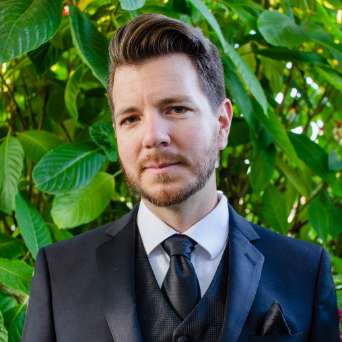In the bicentenary anniversary of Giuseppe Verdi, tributes are aplenty. On Saturday evening, Los Angeles Opera presented a new production of the Italian master’s final work, Falstaff, though that wasn’t all. Following a spirited pre-concert talk by maestro James Conlon, a beautifully detailed bronze bust of the birthday boy was ceremoniously unveiled, a gift of the Italian consulate for permanent display at the Dorothy Chandler Pavilion. It was an impressive tribute and a fine feather in the cap of the relatively young company. Yet the performance to follow was the real treat.
Verdi’s last opera, a challenge in many facets, is one of his most surprisingly rewarding. This new production, directed by Lee Blakeley, was firing on all cylinders from the get-go. Based on two of Shakespeare’s plays, the action is necessarily specific to its original time and place. Bustling and intricate, this production delivers on authenticity. Sets and costumes by Adrian Linford were attractive and functional in the Tudor style. The stage was a raised, wooden Globe-like platform. The action was fluid and logistics were cleverly managed by way of a scrim that helped with transitions (it was also used as a projection screen between scenes). Verdi’s opera, already succinct, was even more so here.
The comedy was presented with a self-awareness that was endearing. But like well done Shakespeare, slapstick was kept at a minimum and the audience’s attention to subtlety was well rewarded. The exceptionally strong cast delivered and performed deftly, to say nothing of their musical prowess.
There was no doubt who the star of the evening was. Roberto Frontali’s performance as the portly knight was masterful. His character was endearing and nimbly delivered. The Italian bass’ voice was rich and complex in hue, but beautifully even throughout his range. It is a large sound that has the flexibility for such a demanding role. While occasionally slipping into “buffa” mode, his voice soared naturally and his high notes were tantalizing. Frontali’s is a voice is a throwback to the golden age of Verdi singing. His first-act monologue was a riot but sung with the utmost conviction in his character’s principals. Frontali’s Falstaff was sympathetic but haunting. This was an endearing character with serious shortcomings, who some of us may not be too far off from becoming – Frontali made that abundantly clear.
The rest of the cast, while not Frontali’s equal vocally, were splendid conspirators. Baritone Marco Caria was a dour and dupable Ford. His aria was a dramatic occasion and sung with a thrilling Verdi baritone sonority. His merry wife, Alice, was sung by the fine singing actress Carmen Giannattasio. A soprano of considerable vocal power, her voice broadened occasionally, but it was a steely, soaring sonority that Giannattasio manipulated for memorable dramatic affect. Erica Brookhyser was lacking in vocal core, but she was charmingly neurotic as the scheming Meg, a nervous counterweight to the brazen Alice Ford.
Russian soprano Ekaterina Sadovnikova was a most memorable Nanetta. Her angelic voice was ample in size, but effortless above the staff. Her Fairy Queen aria was ravishing and sung with sterling control. Her lover Fenton was sung by the young Argentinean tenor Juan Francisco Gatell. With a biting, slightly nasal hue, Gatell sang Fenton passionately and was assured in his deportment. Together, the young lovers were most charming.
Ronnita Nicole Miller was confident and secure as Mistress Quickly. Possessing a burnished alto, Miller was magnetic on stage and played off of Frontali’s Falstaff with keen timing. Joel Sorensen was a last minute substitute for an indisposed Robert Brubaker as Dr Caius, but one wouldn’t have known it. Sorensen owned the role and was a luxurious tenor buffo as the lecherous old man. Falstaff’s turncoat servants were amusingly played by Rodell Rosel and Valentin Anikin, with Rosel earning plenty of laughs for his distinguished comedic contributions as Bardolph.
James Conlon’s forces played with spirit and flexibility. Credit goes to the maestro for a driving, jovial push from the pit, coaxing the strings to play with sensitivity and refinement. It was the best I’d heard the band in recent memory. Grant Gershon’s chorus was excellent as always.
It was a performance by all that left a crisp aftertaste. Verdi’s genius and spirit are unavoidable in this piece, which belies its comedic and musical difficulty. At the curtain calls, the production team bowed last and received just polite applause. But their contributions to the evening were a smashing success. They paid Verdi the best homage possible with their attention to the maestro’s details. It was a Falstaff that bubbled with vitality but was unabashed in its reverence for its roots. In Verdi’s final work, 120 years after its première, LA Opera gave a glimpse of the spirit of the old maestro. Although “he who laughs last, laughs best”, be sure to get in on the joke early and enjoy Falstaff, ere the joke be on you.


